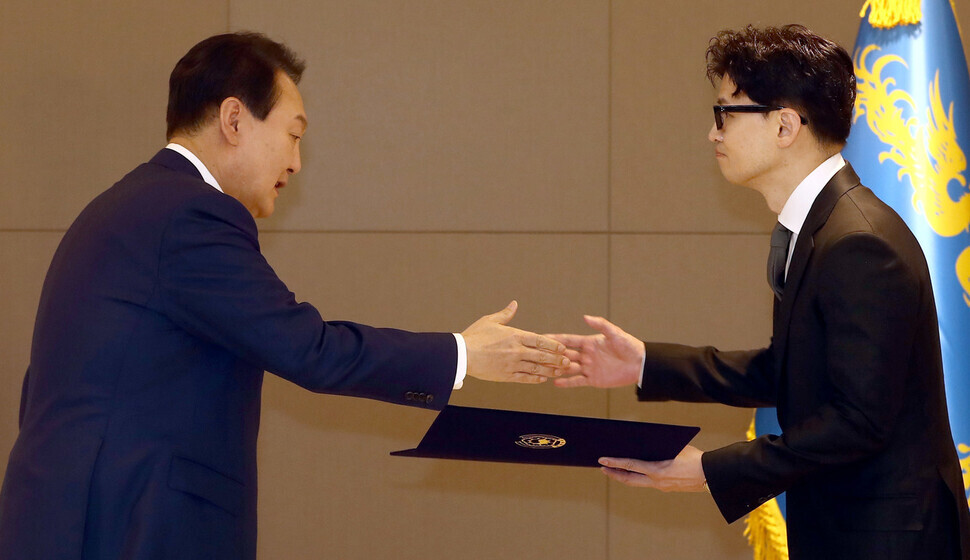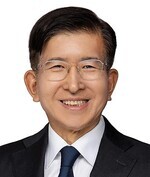hankyoreh
Links to other country sites 다른 나라 사이트 링크
[Guest essay] Mini-President Han Dong-hoon and the impending republic of prosecutors

I was once responsible for appointment vetting duties during my time heading the Bureau of Intelligence at the Korean National Police Agency (KNPA). My job involved reviewing vetting materials on prospective employees for senior government positions and reporting my findings to the Blue House.
It was often quite entertaining reading the vetting materials drafted by the people under me. I have to admit feeling a bit of a “thrill” learning about the secret personal histories of powerful figures.
Additional reports were submitted to the Blue House from other investigation agencies, including the National Intelligence Service (NIS). Combing through them all and making decisions was the job of the senior secretary to the president for civil affairs and their staff.
That post had always been enormously powerful, but I can also remember quite a few cases of abuse of authority by the KNPA and NIS, including leaks of vetting materials and collusion with the people who were being scrutinized. The information related to their appointment was sensitive and important, and the people involved were eager to get their hands on it.
Indeed, the public’s freedoms and rights were even jeopardized at times, with cases of civilians placed under surveillance for the ostensible purpose of “collecting personnel information.”
Because these appointment-related duties are so sensitive and important, the Roh Moo-hyun administration moved to separate personnel nomination duties from ones related to vetting, assigning them respectively to the advisor for personnel affairs and the senior civil affairs secretary in a system of mutual checks and balances. It’s a principle that has been upheld by administrations ever since, progressive and conservative alike.
Now, the Yoon Suk-yeol administration appears poised to have personnel vetting duties carried out by the Ministry of Justice, after abolishing the senior civil affairs secretary’s office in the Blue House, citing the “grave harm” it was causing.
The plan it has announced involves setting up a personnel intelligence management group to perform vetting duties directly under the minister of justice. Prosecutors and police would also be sent in. The related regulations are currently being amended and would reportedly go into effect by the end of this month.
While they’ve snuck these changes in amid a heavy push that includes things like opening up the Blue House to the public and abolishing the office of the senior civil affairs secretary, they are actually quite a serious matter that relates to the very foundation of governance.
If the changes go through as the Yoon administration intends, the Ministry of Justice — or, more precisely, Minister of Justice Han Dong-hoon — will end up with power far beyond the “gravely harmful” level enjoyed by the senior civil affairs secretary in the past.
With the control it recently assumed over the prosecutors through senior-level appointments, this addition of vetting authority for senior government officials would hand him authority above and beyond what the prime minister holds. With that power comes an even greater potential for its abuse.
In its ostensible effort to get rid of the “harmful” office of the senior civil affairs secretary, the Yoon administration has spawned something even more terrifying: a “super-Ministry of Justice” on par with Thomas Hobbes’ Leviathan.
Even that is not the end of it. The Blue House personnel coordinator is a former investigator with the prosecutors, while the secretary for personnel affairs is a former chief prosecutor; both are effectively in league with Han.
This turns Han into the ringleader of a group of prosecutors who now have control over authority for personnel vetting and nominations. That is a serious matter indeed.
The saying goes that “people are everything.” Here, they’ve created a system where the prosecution gets to nominate and scrutinize the people who would hold critical positions in the administration. It brings new meaning to the expression “republic of prosecutors” — and turns Han Dong-hoon in particular into a “mini-president” on his own.
In these circumstances, what Cabinet members, senior secretaries, lawmakers, or government organizations would venture to raise objections toward Han or the prosecutors?
Under the guise of “distinguishing itself from past administrations” by abolishing the senior civil affairs secretary’s position, the current administration has actually announced its blueprint for doing whatever it sees fit to, taking advantage of a “republic of prosecutors” and a “mini-President Han Dong-hoon” who are more powerful and problematic than what they are replacing.
With the prosecutors set to be stripped of their investigation authority, is it reading too much into things to see this latest approach as a bid to prolong the “republic of prosecutors” through appointments rather than investigations? Is it unwarranted to imagine the threat of prosecutors abusing their government authority?
It certainly seems to be the case that people who don’t meet their standards or tastes are likely to find their freedoms and rights in severe jeopardy. It’s also uncertain how well they will be able to respond to fast-changing global trends when their appointments are biased toward members of their own “league.”
Yoon Suk-yeol’s version of the “republic of prosecutors” — by Han Dong-hoon and for Han Dong-hoon — now looks to be setting sail. It’s hard not to fear for the future, given what they say about absolute power and corruption.
Should we trust in the “good intentions” of Han and the prosecutors? Hardly. A person’s good intentions are nothing to put your faith in.
The key thing now is going to be relentless scrutiny of those in power. The words of late President Roh Moo-hyun — who said that the “last bulwark of democracy lies in the organized power of awakened citizens” — seem more urgent now than ever before.

Lee Sang-sik, former commissioner of the Busan Metropolitan Police
Please direct questions or comments to [english@hani.co.kr]

Editorial・opinion
![[Guest essay] Maybe Korea’s rapid population decline is an opportunity, not a crisis [Guest essay] Maybe Korea’s rapid population decline is an opportunity, not a crisis](https://flexible.img.hani.co.kr/flexible/normal/500/300/imgdb/original/2024/0430/9417144634983596.jpg) [Guest essay] Maybe Korea’s rapid population decline is an opportunity, not a crisis
[Guest essay] Maybe Korea’s rapid population decline is an opportunity, not a crisis![[Column] Can Yoon steer diplomacy with Russia, China back on track? [Column] Can Yoon steer diplomacy with Russia, China back on track?](https://flexible.img.hani.co.kr/flexible/normal/500/300/imgdb/original/2024/0430/1617144616798244.jpg) [Column] Can Yoon steer diplomacy with Russia, China back on track?
[Column] Can Yoon steer diplomacy with Russia, China back on track?- [Column] Season 2 of special prosecutor probe may be coming to Korea soon
- [Column] Park Geun-hye déjà vu in Yoon Suk-yeol
- [Editorial] New weight of N. Korea’s nuclear threats makes dialogue all the more urgent
- [Guest essay] The real reason Korea’s new right wants to dub Rhee a founding father
- [Column] ‘Choson’: Is it time we start referring to N. Korea in its own terms?
- [Editorial] Japan’s rewriting of history with Korea has gone too far
- [Column] The president’s questionable capacity for dialogue
- [Column] Are chaebol firms just pizza pies for families to divvy up as they please?
Most viewed articles
- 1Dermatology, plastic surgery drove record medical tourism to Korea in 2023
- 2[Guest essay] Maybe Korea’s rapid population decline is an opportunity, not a crisis
- 3Under conservative chief, Korea’s TRC brands teenage wartime massacre victims as traitors
- 4First meeting between Yoon, Lee in 2 years ends without compromise or agreement
- 5Months and months of overdue wages are pushing migrant workers in Korea into debt
- 6Thursday to mark start of resignations by senior doctors amid standoff with government
- 7[Column] Can Yoon steer diplomacy with Russia, China back on track?
- 8[Editorial] When the choice is kids or career, Korea will never overcome birth rate woes
- 9South Korea found the most ramen-eating country
- 1046% of cases of violence against women in Korea perpetrated by intimate partner, study finds